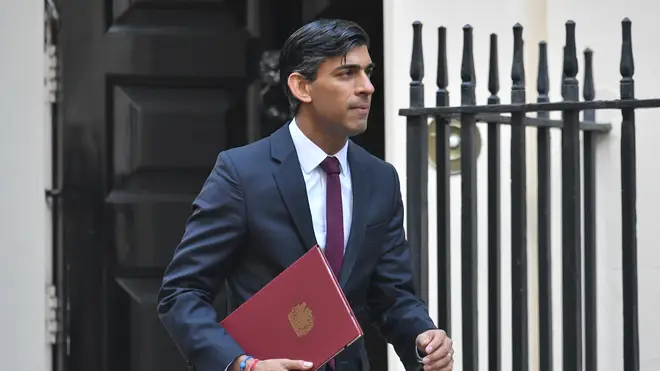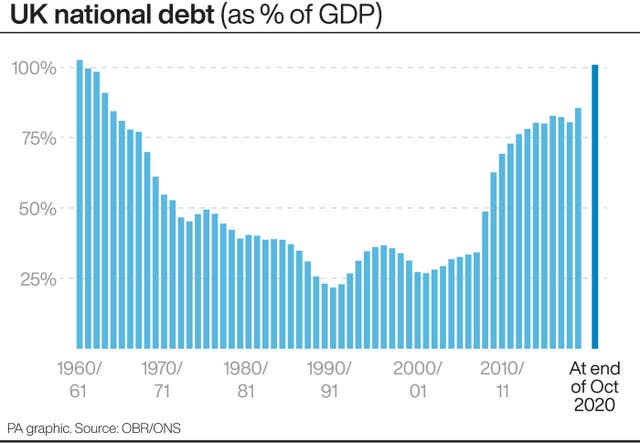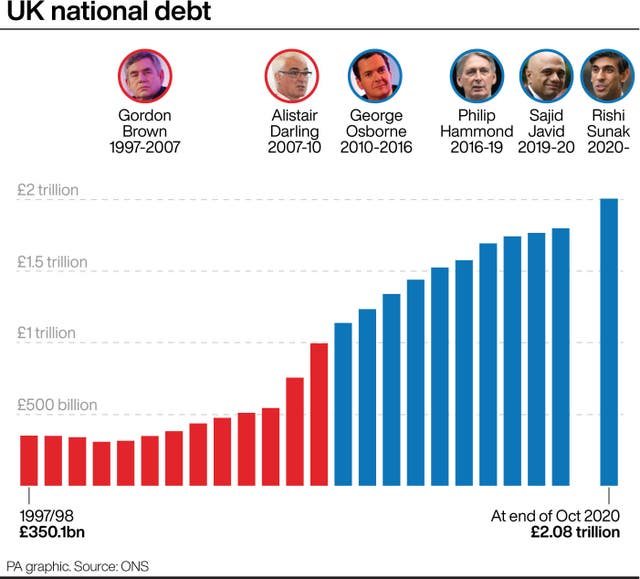
Nick Ferrari 7am - 10am
20 November 2020, 12:54

The UK’s debt is now more than 100% of national income.
Chancellor Rishi Sunak is promising to put the public finances back on a “sustainable path” for the future as he prepares to unveil his first spending review.
– What is the problem he has to address?
The coronavirus outbreak has punched a huge hole in the public finances.
Lockdown brought activity screeching to a halt, with tax revenues drying up, while the Treasury has paid out more than £200 billion on furlough and other schemes to try to nurse the economy through the crisis.

The latest official figures for October show public sector debt passed the £2 trillion mark for the first time in history.
In means the UK’s debt is now more than 100% of national income – a level which many economists believe cannot be sustained over the medium-term.
– What is the Chancellor going to do about it?
The spending review on Wednesday offers the Chancellor his first opportunity to begin to repair the damage, and all the signs are that he will start with a new cap on public sector pay, except for frontline NHS doctors and nurses.
The Centre for Policy Studies – a centre-right think tank – has calculated that a three-year total pay freeze would save £23 billion, or £15.3 billion if the NHS is excluded.

Alternatively, it said that an annual 1% pay cap would save £11.7 billion over three years, or £7.7 billion if it did not apply to healthcare workers.
– How has that gone down?
Badly, at least as far as the trade unions are concerned.
They say millions of workers including teachers, police officers and members of the armed forces, have already seen their living standards fall as a result of the last round of pay restraint imposed by the Government following the global financial crash.
But Mr Sunak has argued that since the pandemic, it is private sector workers who have been hardest hit, and that “fairness” demands their public sector counterparts should now shoulder some of the burden.
"If the government goes down the road of imposing a pay freeze on top of everything else, it is in danger of precipitating a crisis in which many teachers and leaders decide enough is enough." Our full response to reports of a public sector #payfreeze https://t.co/VFIhbkhq8W pic.twitter.com/lRc9FHVNoG
— ASCL (@ASCL_UK) November 20, 2020
– Anything else on the cards?
The Chancellor is expected to announce that he is suspending the UK’s commitment to spend 0.7% on overseas aid, with a cut to 0.5% thought likely.
But this is another controversial move, as the 0.7% target is enshrined in law and was reaffirmed in last year’s Conservative general election manifesto.
Aid agencies have accused the Government of trying to balance the books on the backs of the world’s poorest people.
– Will that be enough?
Unlikely. Ahead of the review, Boris Johnson announced a big uplift for defence which will receive a four-year settlement, unlike the rest of Whitehall, which is getting just a single year’s allocation due to the economic uncertainty.
Our Armed Forces represent the very best of our country.
We are ending the era of retreat and strengthening our defence budget with £16.5 billion over the next four years. https://t.co/SWRzM8Pdhu pic.twitter.com/rH30RoQYeD
— Boris Johnson (@BorisJohnson) November 19, 2020
That means that other departments could well see their budgets come under pressure with demands for further belt-tightening.
– What about taxes?
Almost certainly they will have to go up at some point, although that is for another day.
Most economists believe the priority is to get the economy back on track and growing again before the Chancellor considers any new levies which could send it into reverse.
When he does, his room for manoeuvre may be limited as the Conservative manifesto commits the Government to freezing income tax, VAT and national insurance for the rest of the Parliament, meaning Mr Sunak may have to look elsewhere.